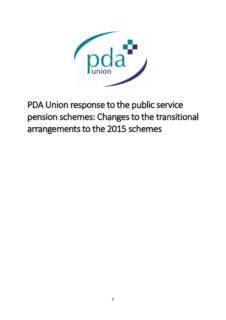As we reported last month, the Government launched a consultation on the changes needed to all public service pension schemes following the outcome of a case taken by the Fire Brigades Union against the Firefighters Pension Scheme. The outcome of which found that some aspects of that scheme, including the protection offered when changes were made to the scheme in 2015, had discriminated against scheme members on the grounds of their age, illegal under the Equality Act.
This has required a review of all public service pension schemes, including the NHS Pension Scheme. However, unlike the Firefighters scheme, it is not certain that members have been discriminated against because of their age. This is because the changes brought in in 2015 included a change from a final salary scheme to a Career Average Revalued Scheme making a direct comparison between the two difficult.
Essentially this change meant pensions would no longer be based on a person’s earnings close to retirement, but instead would be based on average earnings over a person’s career, with the segment of the pension earned in each year increased by an amount above inflation each year until retirement. It is therefore not clear cut that one set of rules would automatically produce a worse pension than the other.
Although there are a number of questions asked in the consultation document, the key question is about giving members a choice of the old or new rules.
The PDA has therefore argued strongly through its response to the consultation that the only way to ensure no one suffers age discrimination in the NHS scheme is if all members are given a choice at retirement to take a pension based on the better of the two sets of rules, the final salary or the CARE rules.
There is general agreement that a choice should be offered. The important point is when. The PDA has argued this choice must be when a person’s benefits crystallise, either at retirement or on ill-health or on death. The choice now would be meaningless, confusing and lead to widespread distrust about the scheme as no one can predict with any certainty what their benefits under the CARE arrangement will be.
The PDA response has therefore focused on this point, making the case for deferred choice so that members can make the decision based on the facts and not for an immediate choice, leaving members to make decisions on assumptions about inflation and their individual earnings growth. We have made it clear that deferred choice, based on real numbers, is in the interests of all scheme members while immediate choice, based on guestimates, will inevitably create confusion which in turn can only be in the interests of financial advisors.
There does seem to be a wide consensus that includes NHS employers, all other NHS trade unions and the administrators of the scheme in favour of deferred choice so we are very hopeful that sense will prevail. It was very important however that the PDA has ensured NHS pharmacists are part of this consensus. The consultation closed on 11 October and members will be informed once we know whether or not our arguments in favour of deferred choice have been successful.
Download the response here
Related links:
- PDA responds to public service pension scheme consultation
- A link to the consultation can be found here and individuals can also submit their own response.
- A link to the various NHS Pension scheme sections with their rules is here
- Details of the various benefit structures of the various sections can be found in the member guides here
